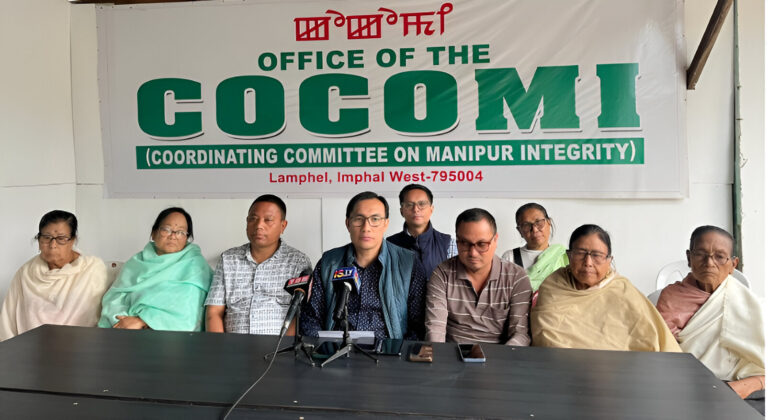Manipur Women Vendors Protest Storage Boxes Installation
Summary
Manipur’s Khwairamband Ema Keithel women vendors are protesting the installation of storage boxes by the Social Welfare Department. The vendors argue that the department implemented this initiative without consulting them, resulting in boxes that are too small and inconvenient for their workspace. The vendors demand their removal, criticizing the secrecy and lack of discussion around the project. Meanwhile, the department defends the move, claiming it aimed to help the vendors store goods and was based on a request made in 2021.
Long Article
Introduction: A Conflict at the Heart of Manipur’s Market
Imagine having a workspace where someone else decides what is best for you—without asking for your opinion. That’s exactly what’s happening to the women vendors of Khwairamband Ema Keithel, one of the largest all-women markets in Asia, located in Manipur. These vendors recently found themselves at odds with the Social Welfare Department of the state after the installation of storage boxes beneath their seats. But why has this sparked such an intense response from these women?
Let’s dig deeper into this story, understanding the context behind the controversy, the vendors’ concerns, and the department’s defense, and why it matters so much for the future of this iconic market.
The Iconic Khwairamband Ema Keithel: A Symbol of Empowerment
Khwairamband Ema Keithel isn’t just a marketplace—it’s a cultural and historical symbol of women’s empowerment. The market is entirely run by women, who have carried on this tradition for generations. For these women, their stalls are their livelihoods, and any changes made to the infrastructure of the market could directly impact their ability to make a living.
This market has seen various developmental changes, but those are typically done after consulting the vendors, many of whom hold licenses from the Imphal Municipal Corporation (IMC) and the Municipal Administration, Housing, and Urban Development (MAHUD). Any changes affecting their workspace without their input are seen as a disruption not only to their business but to the legacy they uphold.
The Controversial Installation of Storage Boxes: What Happened?
Recently, the Social Welfare Department began installing small storage boxes under the seats of the vendors. This project, however, was met with immediate backlash. Leishram Memma, the convenor of the Khwairamband Ima Keithel Joint Coordinating Committee, made it clear that the vendors had not been consulted before this initiative was rolled out.
Memma expressed that any developmental work concerning the market must go through official channels—like the IMC or MAHUD—and include discussions with the licensed vendors. But in this case, the department acted without their consent, carrying out construction under the cover of night.
Here’s where the real problem lies: these storage boxes, though intended to be helpful, are seen as more of a hindrance. They are too small, offering limited space for the vendors’ goods, and they restrict movement around the workspace. Essentially, they complicate the everyday operations of the vendors.
Why Were the Storage Boxes Installed?
The Social Welfare Department, on the other hand, has a different perspective. According to Director Ng Uttam, the storage boxes were constructed using funds from a special Nirvana scheme, aimed at improving conditions for the vendors. The idea came after former union minister Smriti Irani visited Bishnupur in 2021 and interacted with the women vendors. During this interaction, the vendors had reportedly requested storage facilities, which led to the initiation of the project.
Uttam also defended the timing of the construction, explaining that the boxes were installed at night to avoid disturbing business activities during the day. The intention was to help the vendors by providing them with a designated storage area, but if the boxes are unwanted or disruptive, he stated that they could be removed.
A Communication Breakdown
At the heart of this issue is a lack of communication. While the Social Welfare Department claims that the installation was done in the vendors’ best interest, the vendors feel betrayed by the secrecy and the lack of consultation. Their main frustration stems from the fact that they were left out of the decision-making process entirely.
This isn’t the first time that infrastructure developments in Manipur’s markets have stirred controversy, and it likely won’t be the last. The conflict between the vendors and the department reveals a deeper issue of trust and transparency.
The Vendors’ Demands
The women of Khwairamband Ema Keithel are not backing down. They have made their position clear: they want the storage boxes removed. Their concerns go beyond mere inconvenience. They believe that the project was driven by contract work to generate money, rather than genuinely serving the needs of the vendors.
Memma and other leaders within the market are demanding that those responsible for this secretive initiative be held accountable. For them, it’s not just about the boxes—it’s about their autonomy and their right to have a say in decisions that directly affect their livelihoods.
Why This Matters: The Bigger Picture
This protest by the vendors highlights a larger issue that resonates across many communities. When government bodies implement projects without engaging with the people directly affected, it leads to frustration, mistrust, and, often, failure. The Khwairamband Ema Keithel vendors’ protest isn’t just a local issue—it speaks to the importance of collaboration, transparency, and respect for grassroots voices in any development initiative.
In the broader context, this incident serves as a reminder that well-intentioned projects can backfire if not properly communicated. The storage boxes were supposed to be a practical solution for the vendors, but without consultation, even the best ideas can be seen as burdensome.
Moving Forward: What Can Be Done?
For this situation to be resolved peacefully, there needs to be a renewed focus on dialogue between the vendors and the Social Welfare Department. Instead of making decisions behind closed doors, the department must prioritize open, honest discussions with the vendors. Only by working together can they find a solution that benefits everyone.
If the storage boxes are indeed removed, it could be an opportunity for both sides to reassess the real needs of the market and how to address them in a way that empowers the vendors without infringing on their space or autonomy.
Conclusion: A Lesson in Listening
The Khwairamband Ema Keithel women vendors’ protest is a powerful reminder that real progress can only happen when those in power listen to the people on the ground. Whether it’s a storage box in a market or a larger-scale infrastructure project, decisions that affect livelihoods must involve the voices of those directly impacted.
As this story continues to unfold, one thing is clear: the women of Manipur’s most famous market are not just passive participants in their own story—they are vocal, determined, and ready to stand up for what they believe is right.
FAQs
- Why are the women vendors protesting?
The vendors are protesting because storage boxes were installed in their market without their consent, making their workspace inconvenient. - Who installed the storage boxes?
The Social Welfare Department of Manipur installed the storage boxes as part of a project funded by the Nirvana scheme. - Why were the boxes installed?
The boxes were installed to provide storage for vendors based on a request made in 2021, but the vendors claim they were not consulted about the specifics. - What are the vendors demanding?
The vendors are demanding the removal of the storage boxes and want greater transparency in future decisions affecting their market. - What is the Social Welfare Department’s defense?
The department claims the boxes were installed to help vendors, and they were constructed at night to avoid disrupting business.




